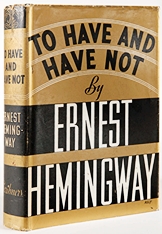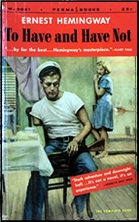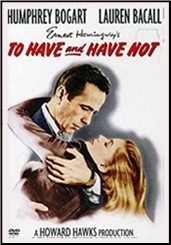Wed 9 Nov 2022
Reviewed by Tony Baer: ERNEST HEMINGWAY – To Have and Have Not.
Posted by Steve under Reviews[14] Comments
ERNEST HEMINGWAY – To Have and Have Not. Charles Scribner’s Sons, hardcover, 1937. The initial seed for the novel was the short story “One Trip Across,” published in Cosmopolitan, April 1934, and which introduced the character of Harry Morgan. A second portion was published in Esquire, February 1936, as “The Tradesman’s Return.” Reprinted many times. Filmed in 1944, starring Humphrey Bogart and Lauren Bacall.

To Have or Have Not remains the best of the tough novels of its decade and perhaps the best yet written in Americaâ€â€”Tough Guy Writers of the Thirties, ed. David Madden (1968).
Alright. I guess that means I have to read it then, eh? But perhaps, Professor, you can suggest why you think it’s so great?
“The world Hemingway portrays in To Have or Have Not is…the essential milieu of all tough novels, a society so dominated by crime and injustice that law and order have become viciously hypocritical terms. Only power, money, and indomitable individual action make for survival, and if one must survive at the expense of others, so be it. Consequently…a man must sometimes act as a ‘criminal’ in order to win decency and dignity as a man….His toughness is both necessitated and justified by the social jungle he inhabits.†(Madden).
Okay. Well, anyway, the book has nothing to do with the movie. Forget you ever saw the movie — it will only confuse you. Yeah there’s a boat. But that’s about where the similarity stops.

Harry Morgan has a fishing boat that he charters and captains for wealthy tourists in Key West.
What turns everything to shit is that Harry is approaching the end of tourist season and he’s banking on his current big-city client to get him enough dough to make it to next Spring. But the customer ‘dines and dashes’, leaving Harry in the lurch.
So he reluctantly agrees to be wheelman (can you be wheelman on a boat?) in a Key West bank robbery for some Cuban revolutionaries. “[H]e heard a noise like a motor backfiring. He looked down the street and saw a man come out of the bank. He had a gun in his hand and he came running. Then he was out of sight. Two more men came out carrying leather briefcases and guns in their hands and ran in the same direction….The fourth man, the big one, came out of the bank door as he watched, holding a Thompson gun in front of him, and as he backed out of the door the siren in the bank rose in a long breath-holding shriek and Harry saw the gun muzzle jump-jump-jump-jump and heard the bop-bop=bop-bop, small and hollow sounding in the wail of the siren.â€
Once Harry gets them headed towards Cuba, however, it becomes obvious the revolutionaries aren’t planning on leaving any witnesses. So Harry has to do what he has to do to survive. “Crouching low, Harry watched him move until he was absolutely sure. Then he gave him a burst. The gun lighted him on hands and knees, and, as the flame and the bot-bot-bot-bot stopped, he heard him flopping heavily.â€

There’s no happy solutions to Harry’s situation, though (unlike Bogie and Bacall). “No matter how a man alone ain’t got no bloody fucking chanceâ€. The only equalizer is “the Colt or Smith and Wesson; those well-constructed implements that end insomnia, terminate remorse, cure cancer, avoid bankruptcy, and blast an exit from intolerable positions by the pressure of a finger; those admirable American instruments so easily carried, so sure of effect, so well designed to end the American dream when it becomes a nightmareâ€.
It’s a good book. And it’s tough. Is it the best of the tough-guy novels? I dunno. I’m too uneducated to say. But it’s boiled a whole lot harder than the movie.
Last thing I’ll say is that one thing the great writers do better than the rest is making the setting part of the story. I knew the book was over when I read the final lines even though more pages were left to turn on my Kindle. I knew it was over. Like the final still in a film. The sea and ship were as much a part of the story as the dialogue. But I didn’t know it until I read the final line. And chills crawled across my neck as I read:
“Through the window you could see the sea looking hard and new and blue in the winter light. A large white yacht was coming into the harbor and seven miles out on the horizon you could see a tanker, small and neat in profile against the blue sea, hugging the reef as she made to the westward to keep from wasting fuel against the stream.â€
November 9th, 2022 at 7:51 am
Most people forget that John Garfield also starred in a 1950 film, titled THE BREAKING POINT. This is the version I like the best.
Also Audie Murphy starred in another version, THE GUN RUNNERS made in 1958.
November 9th, 2022 at 9:07 am
Walker,
I’ve not seen either—but the synopsis on Wikipedia makes it sound like “The Breaking Point†is much closer to the original story. Except all film versions have a pretty young thang (Patricia Neal; Lauren Bacall) that doesn’t exist in the book. In the book, Harry Morgan loves his overweight middle-aged wife to bits. And the feeling is mutual (he too is big and ugly). He commits the crime for the love of his family (well—his wife anyway; he and his wife are in agreement that their 3 teenaged daughters are vacuous sloths).
November 9th, 2022 at 11:06 am
Most people forget the Garfield and Murphy incarnations because their films did not play, they were unsuccessful. Howard hawks got it right. I have read the story, but never again., The hell with Hemingway and his self-pitying narrative.
November 9th, 2022 at 2:16 pm
Barry,
That may be true–but it seems to me that all Hawks got from Hemingway is the title. If he would’ve just called it “Sexy Boating with Bogie and Bacall” he could’ve saved a lot of money.
November 9th, 2022 at 2:53 pm
Tony,
He made a lot of money, and in musical terms, composed a riff on Hemingway’s theme song. The variations, especially the Garfield-Curtiz picture had to be satisfied with good reviews.
November 9th, 2022 at 3:15 pm
I can’t testify to the truth of it, but I’ve read that Hemingway considered THE BREAKING POINT to be the best film version of his work.
November 9th, 2022 at 3:35 pm
This article seconds Michael’s statement that Hemingway thought The Breaking Point was the best film adaptation of his work. It also says that the film’s failure at the box office was because: “Garfield was summoned to testify before the U.S. Congressional House Committee on Un-American Activities (HUAC) and refused to name names. His career effectively ended. Jack L. Warner would not publicize the movie and there would be no more movie offers for Garfield.” https://www.film-foundation.org/hfpa-breaking
November 9th, 2022 at 3:59 pm
Tony, that may be partially so, but Garfield’s box office clout had been steadily declining. Force of Evil, as an example, did not do the business Body and Soul did. An interesting but truly pretentious picture.
As for Hemingway liking The Breaking Point, other than To Have and Have Not and the Gary Cooper variation, For Whom the Bell Tolls, other adaptations did not resonate outside of a few big cities.
November 9th, 2022 at 4:28 pm
As for Jack Warner holding back promotion, Garfield did Under My Skin for Fox, same result, in the same year.
November 9th, 2022 at 9:24 pm
Hemingway supposedly wrote the book in part as an answer to what he saw as a flawed concept in Dashiell Hammett’s work that toughness alone wasn’t enough to save a man, that in fact it might doom him as much as weakness.
I think it is a misreading of Hammett, but I can see where you could interpret Hammett as Hemingway did if you read his work on the surface and miss the real bitterness in his books.
My interpretation has always been that Hammett is well aware that Spade, Beaumont, and even Nick Charles are trapped in their worlds and their roles unable to escape the fate they have created for themselves, but I can see where others see only the surface toughness
and imagine he is suggesting their toughness saves them (I don’t see where a knowledge of Hammett’s own life suggests that).
Hemingway disliked most of the films of his work (even the ones with his buddy Gary Cooper), but had good things to say about THE KILLERS, UNDER MY SKIN (Based on “My Old Man”), and THE BREAKING POINT.
It is a tough book and a good read, but I think Hawks was at least right it is Hemingway’s least important book to that date if not actually his worst. I’m not sure this kind of thing didn’t benefit in some real ways from the pulp sensibilities of a Cain or Hammett over the greater artist.
November 9th, 2022 at 11:39 pm
About being trapped in our worlds, David. We all are, with or without Hemingway’s observation.
November 10th, 2022 at 9:26 am
I remember reading a pretty good analysis of this here a while back:
https://mysteryfile.com/blog/?p=21005
November 10th, 2022 at 10:05 am
Dan,
Yes–that’s a terrific article weaving in all 3 adaptations as well. My only difference with your reading of the book is that, as you point out, there are: “sudden jumps in time, location, narration and focus, one wonders if the legendary author was pointing the way for writers like Ken Kesey and Carlos Fuentes or just being lazy.”
Partially because of my reverence for Hemingway and partially because I’m an idiot I simply read the thing as a straight story. Which means that I took the “sudden jumps in time, location, narration and focus” in stride, just as part of the film that was playing in my mind.
It did not occur to me that Hemingway was trying to score political points or was showing the ‘haves’ vs. the ‘have nots’. My reading was so facial that it never occurred to me that he was referring to nouns: ‘the haves and ‘the have nots’. I only read the title as straight forward verbs ‘to have’ and ‘to have not’.
Reading commentary afterwards it seems you’re likely right–that Hemingway was probably trying to make a political statement with the impressionistic montage scenes of the fruity bourgeoisie in the third act using Gertrude Stein inspired prose.
But in the end, taking the story at its face, Harry kills the communists. And while he may have ‘intended’ the story to be about haves and have-nots all that I got out of it was a story about a sailor trying to provide for his family in any way he could. And failing.
November 10th, 2022 at 6:04 pm
No post on this blog should have exactly 13 comments.